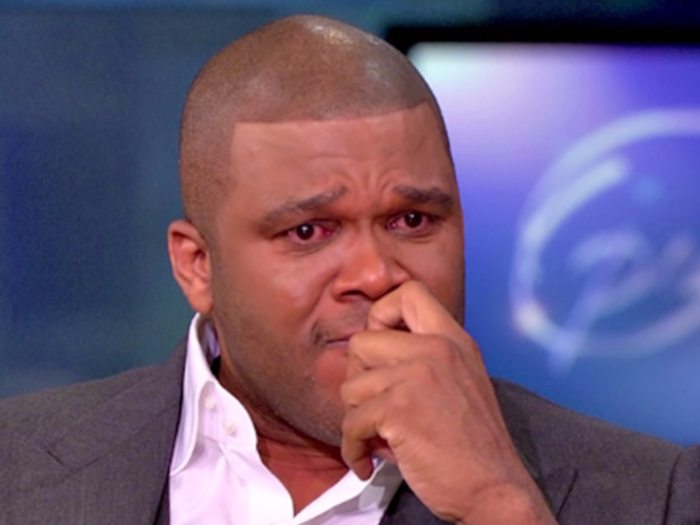
Perry changed his name at the age of 16 to distance himself from his dad. His early years influenced much of his early work. In 2009, he revealed on his website that he was molested as a young child by the mother of a childhood friend and a man from his church.



Tyler Perry’s many plays toured on what’s known as the chitlin’ circuit, essentially tour destinations in the United States where artists can reach the black audience. (Chitlin’ is short for chitterlings, which is an odorous, staple soul food item.)
Now, the name Madea has entered the pop culture lexicon, having been parodied on shows like “South Park” and “American Dad!” But before that, Tyler Perry and Madea were becoming household names in the African American community.

Perry continued to write and perform in plays, reprising his role as Madea on the stage as recently as 2015.
Source: Forbes

Tyler Perry used the money he made from the stage to partially finance his first film. It was the first time a wider audience would be exposed to Madea. "Diary of a Mad Black Woman," based on his earlier play of the same name, debuted at #1 the weekend it was released in 2005. He debuted at #1 again with his second film, “Madea’s Family Reunion” the following year. His third film, “Daddy’s Little Girls” starring Idris Elba, was his first film without Madea.

"House of Payne," was the first of two shows he developed for TBS.

Tyler Perry had experienced a pretty positive reputation among fans, if not among film critics, until 2009. Director Spike Lee, who wrote and directed films about the black experience like “Do the Right Thing” and “Malcolm X” called Tyler Perry’s brand of entertainment “coonery buffoonery.”
Lee was not alone in making the argument that Perry’s characters perpetuated embarrassing and demeaning stereotypes of black people, such as the sassy, uneducated, loud-mouthed black woman.

In 2011, Perry took it further, telling Spike Lee and other critics to “go to hell.” In 2013, Perry struck a lighter tone with Oprah, saying that he admired Lee’s work.
Source: CBS

In what seemed like an effort to prove that he was more than Madea, Perry began to take on new challenges in Hollywood. He co-produced the Oscar-nominated film “Precious” in 2009.

In 2012, he briefly tried his hand at being a leading man (in a role as a man). He played Detective Alex Cross, a role previously portrayed on screen by Morgan Freeman. Subsequently, he had supporting roles in a string of films that run the critical spectrum, from 2014’s “Gone Girl” to this year’s "Teenage Mutant Ninja Turtles" sequel.

Source: Forbes

Perry’s second show developed for the network, "The Haves and Have Nots," a soap opera in every sense of the word, helped break viewership records for OWN. In August, Perry’s show "Too Close to Home" premiered as the TLC network’s first scripted show.

Source: Us Weekly

It seems despite all his different projects, Tyler Perry can’t stay away from the character that made him famous. This time, Madea is taking on Halloween.
Oddly enough, the movie and its title were all based on a joke in a film written by and starring Chris Rock. In 2014’s "Top Five," Andre Allen, Rock’s character, has a movie released on the same weekend as the fictional Tyler Perry/Madea movie, “Boo,” which performs significantly better than Allen’s film. Rock said in a press event for "Top Five" that Lionsgate, the company that produces Perry’s films, wanted Perry to make "Boo" a reality. Fast forward two years, and here we are.
 A couple accidentally shipped their cat in an Amazon return package. It arrived safely 6 days later, hundreds of miles away.
A couple accidentally shipped their cat in an Amazon return package. It arrived safely 6 days later, hundreds of miles away. A centenarian who starts her day with gentle exercise and loves walks shares 5 longevity tips, including staying single
A centenarian who starts her day with gentle exercise and loves walks shares 5 longevity tips, including staying single  2 states where home prices are falling because there are too many houses and not enough buyers
2 states where home prices are falling because there are too many houses and not enough buyers "To sit and talk in the box...!" Kohli's message to critics as RCB wrecks GT in IPL Match 45
"To sit and talk in the box...!" Kohli's message to critics as RCB wrecks GT in IPL Match 45
 7 Nutritious and flavourful tiffin ideas to pack for school
7 Nutritious and flavourful tiffin ideas to pack for school
 India's e-commerce market set to skyrocket as the country's digital economy surges to USD 1 Trillion by 2030
India's e-commerce market set to skyrocket as the country's digital economy surges to USD 1 Trillion by 2030

Copyright © 2024. Times Internet Limited. All rights reserved.For reprint rights. Times Syndication Service.